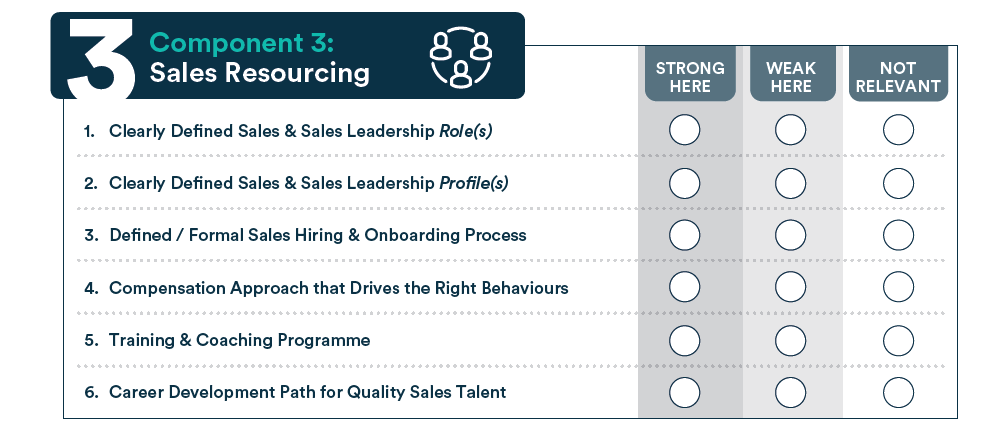- Supports
- About
-
News and Events
News and Events
Events
How can we help?
Building the Sales System – Sales Resourcing
20th
October 2023
By Michael McGowan
The third component of a world-class sales system is resourcing which is the people and talent strategy component. We have to invest to attract the right profile of professional salespeople who can fill precisely defined roles. Strong sales organisations also invest in continuous skills development to support daily performance and offer win-win compensation packages.
Clearly Defined Roles: In the B2B sales domain we put a lot of emphasis on finding the “perfect” salesperson for roles that may not be that well defined. A sales role is actually a very narrow role in terms of the outcomes it produces, i.e. opportunity creation and opportunity capture. Yet, job adverts for most sales roles specify a very high number of activities and duties that are interesting, but irrelevant. Making the monthly or quarterly number, accurate forecasting, intensive prospecting, sales cycle reduction and qualifying in quality business describes the main responsibilities of most sales roles.
Clearly Defined Ideal Salesperson Profiles: Sales roles even in well-resourced large companies are ranked among the toughest to fill. Part of the difficulty arises from trying to hire “holy grail” candidates who simply do not exist. There is a proven, effective way to hire well for sales roles. Define up to three skills-related criteria and then add one to two “soft” criteria, the key ones being empathy and drive. Otherwise you will end up with “profile creep”, i.e. an endless list of candidate requirements that lead to all the good candidates being rejected.
Formal Hiring & Onboarding Process: There is plenty of advice available today around best-practice hiring which can be applied to any role including sales, but sales hiring comes with its own caveats. In particular, “everyone” should not have a vote when it comes to selecting a salesperson. It’s not an election. A small group of 1-3 people with a high stake in the person’s success should share a common selection and scoring template. And the manager to whom the new hire will report should have the biggest and final say in who is selected. We tend to think that salespeople will be successful on their own, but this is largely not the case. It’s how they combine with their direct boss or manager that creates success along with an accelerated onboarding programme.
Compensation: Compensation is an emotive issue when it comes to sales, with a general perception that salespeople are overpaid, especially if they are paid more than everyone else in the company. The reality is that sales, especially any role that requires new business creation, is difficult, high risk and low yield. If the role involves selling in a global market, often against much better resourced competitors, you can multiply the difficulty by a factor of at least two. If the salary level is too low the pipeline of candidates you attract will not meet your expectations and you will be struggling to make a silk purse out of a sow’s ear. Similarly, if OTE (On Target Earnings) is tightly restricted, you automatically cut out the best tranche of salespeople. Bear in mind that there is a very small percentage of the sales population with the skills you need to grow your revenue and customer base – it’s under 15%!
Training & Coaching Programme: The traditional thinking around training for salespeople is that they should already know what to do and hit the ground running. This is one of the great underestimations that managers and bosses make, i.e. that there is no need for a structured training or coaching programme or framework. Occasionally, an individual salesperson will succeed fantastically on their own, but for each one that does a multiple of at least five will fail. Some of the people who fail are simply not suited to sales, but the majority simply lack the competencies, because they were never trained.
Career Development Path: Some salespeople move into sales management and senior management roles, but not that many. It’s one of the reasons that the high quality salespeople hit the glass ceiling when it comes to career advancement and it’s why they leave you. When someone is “good” at sales, especially business development, they will have high income goals, because they know they can do what it takes to succeed at what is a difficult role. There might be a – small – queue of people who could replace them, but are likely not anyway as effective. That’s why a career development path has to take into account the scope for senior “earners” to continue to get the rewards they are due.
|
| Michael McGowan is Co-Founder of Smart Sales Talent Group.Michael has extensive international sales and sales management experience and has worked with global sales organisations in the U.S.A.U.K.,Europe and Asia. He has been a prime contributor on the Enterprise Ireland International Selling Programme since 2006 and hundreds of successful Irish companies selling globally,use his sales system based on DEI sales model. |


